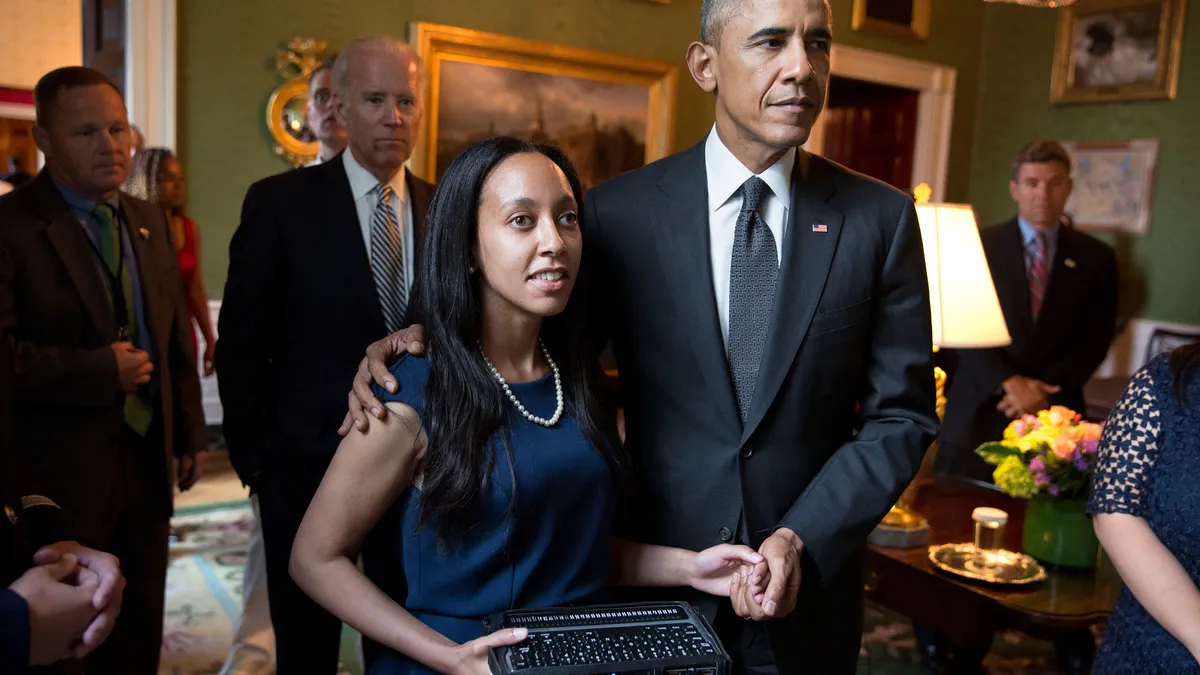Haben Girma, the first blind and deaf woman to graduate from Harvard University, has been on a years-long mission to change the way big corporations think about the value of investing in technological innovations for people with disabilities.
In her view, making such investments isn’t just about legal compliance — it’s also good business.
This week, the 34-year-old disability rights advocate will take her message to about 1,500 finance leaders gathered at Gartner’s 2023 CFO & Finance Executive Conference near Washington, D.C. The two-day summit, which will get kicked off on Wednesday, will feature Girma as a guest keynote speaker.
“An audience is a gift, and I’m grateful @Gartner_Inc gave me this platform to teach people about #accessibility,” Girma tweeted last week.
About 1.3 billion people across the globe experience significant disabilities, according to the World Health Organization. A 2020 study estimated the annual disposable income of the disability market at $13 trillion.
“We’re a huge market, and it’s important for organizations to invest in accessibility,” Girma said in a video previewing her upcoming Gartner remarks, slated for Thursday morning.
About 96% of websites don’t meet accessibility requirements under Web Content Accessibility Guidelines published by the World Wide Web Consortium, according to research released in February by WebAIM, part of the Institute for Disability Research, Policy and Practice at Utah State University.
However, digital accessibility is an area that could see rapid growth, driven by legislation, contractual obligations, and diversity and inclusion initiatives, according to a Gartner report published in February.
“In the next one to three years, Gartner expects to see a turning point for digital accessibility akin to the ‘General Data Protection Regulation moment’ experienced in privacy,” the report said.
The theme of this year’s Gartner conference is driving business growth amid challenges such as high inflation, scarce talent and global supply constraints, according to Gartner spokesperson Rob van der Meulen.
“I believe Ms. Girma’s presentation will make the case that improving accessibility for disabled people offers CFOs a route to untapped customers, talent and innovation,” he told CFO Dive.
Girma, who describes herself as deafblind with very little hearing and sight since birth, is no stranger to the public spotlight. Over the years, she has been invited to speak at events hosted by a range of organizations, including big tech companies like Apple and Google, as well as universities around the world.
She was honored in 2013 by then-President Barack Obama as a “White House Champion of Change.” In 2015, she delivered remarks at a White House event celebrating the 25th anniversary of the Americans with Disabilities Act. She has also received the Helen Keller Achievement Award and earned a spot on Forbes’ 30 Under 30 Law and Policy list.
An Oakland, California native, Girma surfs and salsa dances and is the author of a best-selling memoir. She credits the ADA with giving her opportunities that she would not have enjoyed had she grown up in her parents’ home country of Eritrea.
In 1983, five years before Girma was born, her mother came to the U.S. from Eritrea as a refugee during that nation’s War of Independence with Ethiopia. Later, Girma’s mother and Eritrean-born father met in California.
Girma graduated from Lewis and Clark College with a Bachelor of Arts Degree in 2010 and then went on to become the first deaf and blind student to graduate from Harvard.
In 2014, while serving as a staff attorney for Disability Rights Advocates, a nonprofit headquartered in Berkeley, California, she worked on a case filed by the National Federation of the Blind and a blind Vermont resident against Scribd, a provider of e-books and other content. The lawsuit accused the company of failing to make its services accessible to blind readers in violation of the ADA.
Scribd tried to get the case dismissed, arguing the ADA only applied to physical locations. The U.S. District Court of Vermont disagreed, holding that the law covers online businesses as well.
After the Scribd case, Girma’s attention shifted away from lawsuits. In 2016, she started her own business focused on disability rights consulting, writing and public speaking.
“Many organizations want to be accessible and just need help moving in that direction,” she wrote in her memoir. “My mission now is to help increase opportunities for people with disabilities through education-based advocacy.”




















